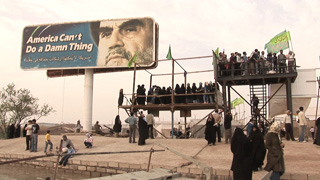Bassidji
 FRANCE, IRAN, SWITZERLAND / 2009 / Persian / Color / 35mm / 114 min
FRANCE, IRAN, SWITZERLAND / 2009 / Persian / Color / 35mm / 114 min
Director, Script: Mehran Tamadon
Photography: Majid Gorjian
Editing: Andrée Davanture, Rodolphe Molla
Sound: Jérôme Cuendet
Producers: Catherine Dussart, Franck Hulliard, Elena Tatti, Thierry Spicher, Mehran Tamadon
World Sales: Urban Distribution International
www.urbandistrib.com
A symbolic place where numerous soldiers lost their lives during the Iran-Iraq war (1980–1988). Following his guide, a member of the Bassidji, the most extremist supporters of the Islamic Republic of Iran, the director travels from this sacred land in the desert near the Iraqi border to the country’s capital, groping for a way to make his film. Gathering the opinions of people he meets along the way—Bassidji who have considerable influence on Iranian society and people on the street—the director observes an Iranian society that is not monolithic at all. Before long he attempts a frank conversation with members of the Bassidji . . .
[Director’s Statement] The Bassidji form the principal pillar of popular support for the Islamic Republic. Their intention is to act as the defenders of a virtuous Islamic society through aid to the poor, general mobilization in time of crisis (war, public-health catastrophe, earthquake, etc.), and promotion of religious values.
In the latter function, as guardians of morality, the Bassidji have proved to be efficient agents of repression against those who do not identify with the religious system put in place after the Revolution. For these Iranians, i.e., the opponents and the non-religious, Bassidji became synonymous with repression and intolerance.
I chose to penetrate the world of the Bassidji to get a better understanding of the paradigms that guide them. Both a social and political project and an individual quest, this film is an attempt to bring together individuals who are totally different (the most radical elements of the Islamic Republic and myself, an Iranian of the diaspora, an intellectual and an atheist living in France), but who are part of the same society, so that they can meet and exchange their ideas.
Despite my fears, I always forced myself to ask real questions, to give an honest point of view while responding to the questions asked. Despite fundamental opposition and total disagreement, I truly tried to initiate the kind of discussion that people who are part of the same society should have if they are to consider one another as human beings and if they care about the survival of their society, their culture, and their world.
Hence I always avoided direct criticism in favor of listening, while affirming my difference, and taking responsibility for who I was and what I thought. I established a direct, frank, and transparent dialogue with people who usually only express themselves within the limits of the official propaganda.
My numerous trips back and forth to Iran, my countless meetings, the temporary confiscation of the first tapes I shot by the Intelligence Service, the intense dialogues, and the moments of shared celebration transformed this film into a personal project, a pathway that is as important as the film itself.
 Mehran Tamadon
Mehran Tamadon
An Iranian architect and filmmaker, Tamadon arrived in France at the age of 12 in 1984. He attended the School of Architecture of Paris-La Villette and received his diploma in 2000. In 1999, he participated in the creation of the review L’Arrosoir, devoted to issues of city and land usage. In the year 2000, he returned to Iran for four years and worked as an architect. Since 2002, his career has taken a distinctly artistic orientation. During an exhibit of conceptual art at the Museum of Contemporary Art in Tehran, he showed an artistic installation called From the Eyes of a Stroller. He also published two essays in Persian: “Moments of Agony” (2003) and “Friendship” (2005). In 2004, he realized his first medium-length documentary, Behesht Zahra, Mothers of Martyrs, which has been presented in numerous international festivals. Bassidji is his first long documentary. |
